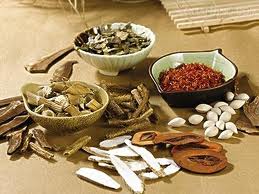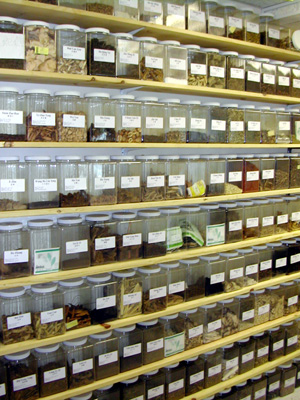| Home | Clinic Info | Acupuncture | Chinese Herbs | Practitioners | Writings |
About Chinese Herbs
 Herbal treatment, shares the same philosophical foundations as acupuncture; and like
acupuncture, seeks
to bring the body back into balance. The Chinese approach to herbal medicine in allopathic in nature:
if the body is cold, we seek to warm it; if it is weak, we try to strengthen it; if qi has stagnated
we attempt to move it. Herbal therapy therefore attempts to change the nature of the body, and not only
treat specific symptoms. This stands in opposition to the practice of western pharmacology, where
concentrated chemical structures are used to affect a specific chemical response in the body. Like
acupuncture, herbal treatment does not follow the idea of “herb A treats symptom B.”
Herbal treatment, shares the same philosophical foundations as acupuncture; and like
acupuncture, seeks
to bring the body back into balance. The Chinese approach to herbal medicine in allopathic in nature:
if the body is cold, we seek to warm it; if it is weak, we try to strengthen it; if qi has stagnated
we attempt to move it. Herbal therapy therefore attempts to change the nature of the body, and not only
treat specific symptoms. This stands in opposition to the practice of western pharmacology, where
concentrated chemical structures are used to affect a specific chemical response in the body. Like
acupuncture, herbal treatment does not follow the idea of “herb A treats symptom B.”
Although there are over 10,000 herbs used in Chinese medicine, most herbal pharmacies stock around 300 common is classified according to function, energetic temperature, and flavors. Generally speaking, flavors impart function: spicy herbs ascend, disperse, and invigorate; sour herbs descend and astringe; bitter herbs descend, cool, and dry. Sweet herbs ascend and nourish; salty herbs descend and dissolve masses; bland herbs descend promote urination. Parts of plants also work on specific parts of the body: flowers ascend and influence the head. Leaves, peels, and barks act on the body’s surface. Stems and vines affect channels and sinews. Roots reach deep into the body, affecting organs. Shells and minerals sink and calm the mind; while animal-based medicines tend to have strong nourishing functions.
 Si Wu Tang, or 'Four Ladies Tea' helps to nourish blood Herbs are rarely taken singly. Rather, they are
combined in formulas-some are thousands of years old, while others are created to treat a specific patient.
Herbs may be combined to mutually strengthen their effects, or to reduce negative aspects in each other.
Formulas can be made as teas, or taken as pre-manufactured pills, powders, or liniments.
In conjunction with acupuncture and diet therapy herbs can have a strong, synergistic and beneficial
effect on the body.
Si Wu Tang, or 'Four Ladies Tea' helps to nourish blood Herbs are rarely taken singly. Rather, they are
combined in formulas-some are thousands of years old, while others are created to treat a specific patient.
Herbs may be combined to mutually strengthen their effects, or to reduce negative aspects in each other.
Formulas can be made as teas, or taken as pre-manufactured pills, powders, or liniments.
In conjunction with acupuncture and diet therapy herbs can have a strong, synergistic and beneficial
effect on the body.
Should I take herbs with acupuncture?
Herbs and acupuncture have a strong synergistic effect. That is, taking both together produces a better result than taking one or the other.
Can I take herbal formulas without acupuncture?
Yes.
Which is better, teas or pills?
In most cases, teas have a stronger effect. Further, they can be modified
to suit an individual, whereas pills have fixed ingredients and dosages.
Do they contain heavy metals or other toxic substances?
Our herbs are imported from China via California, the state with the
strictest codes for heavy metals and other toxins. Each batch is carefully
screened before being released to the general public.